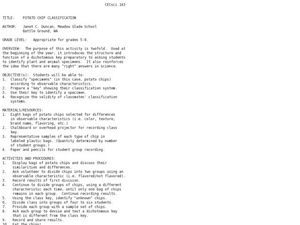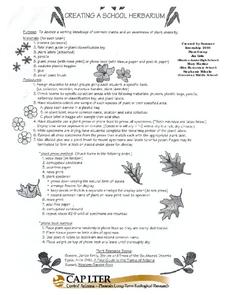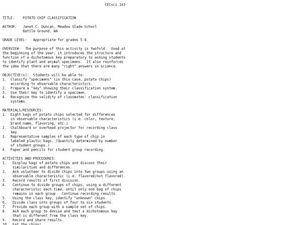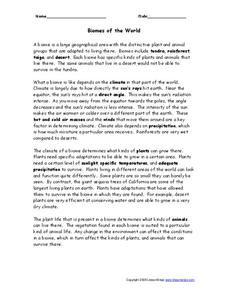Captain Planet Foundation
Which Plant Is Which?
Learn about dichotomous keys, plant identification, and how to care for the planet with a lesson that includes several hands-on and innovative activities. Kids go on a plant scavenger hunt and classify the plants that they find...
Larson Lab
Animal Classification
How are animals classified? Scholars explore animal classification by observing non-living and living specimens. They learn how to organize animals into vertebrates and invertebrates and identify the five vertebrate groups: mammals,...
Curated OER
Name that plant!
What is a dichotomous key? When your kids ask, hand them a learning exercise like this one, to explain it. They use the key to identify four different trees, based on the budding twigs they've produced. Tip: Have learners extend this...
Curated OER
Potato chip Classification
Students create a dichotomous key using potato chips. For this classification lesson, students sort potato chips into groups based on observable characteristics. They record their results to create a dichotomous key in preparation for...
Curated OER
Classify UT Plants and Animals
Students practice using 2 different plant classification keys to identify species. They make choices between the similarities and differences between their object and the classification scheme.
Curated OER
Distinguishing Between Flowers
A branching key is a great way to classify different types of animals and plants! Fifth graders answer several yes/no answers about three different plants. They then create their own key to differentiate between an iris, a rose, and a...
Curated OER
From Curiosity Cabinet to Museum Collection
Students study binomial nomenclature and museum-based research. They create a curiosity box, label the objects in their curiosity box , develop a classification scheme for the objects, and create a database of all objects collected by...
Curated OER
Do You Have the Key?
Students practice using a dichotomous key. For this classification lesson, students read an article about scientific exploration and identification of new species. They use a dichotomous key to identify objects and create their own key.
Curated OER
Creating A School Herbarium
Students create a school herbarium to develop a working assessment of common plants and become aware of plant diversity. They utilize pruners, a plant press, phone book, plant labels, a field plant guide and a classification key to...
Curated OER
Classification 2
Students discuss what makes a living thing (for example, cellular respiration) and collect a selection of living things from outside. They divide their organisms into plants and animals and create a key for the divisions.
Curated OER
Arizona Plant Booklet: An Introduction to Arizona Plants & Cacti
Students explore variety of plants & cacti in their Arizona community by collecting samples and taking photographs. Can be adapted to other areas.
Curated OER
Potato Chip Classification
Young scholars classify specimens by observable characteristics. By classifying potato chips, they are introduced to the dichotomous key for identifying plant and animal specimens.
Curated OER
Centipede or Millipede?
Students discuss millipedes and centipedes in terms of their classification as arthropod. Using a diagram, students categorize and compare and contrast the characteristics of millipedes and centipedes based on their discussion of...
Curated OER
Seed Dispersal
Students determine seed dispersal methods. In this life science lesson, students make predictions about how seeds might move, then look at seeds under micrographs or microscopes to analyze the seed coat and how this helps dispersal. ...
Curated OER
Biomes of the World
In this biomes worksheet, learners read an article on biomes and answer 10 multiple choice, short answer or true and false questions relating to biomes.
Curated OER
Make Sense of Nature
Learners participate in this program that heightens their awareness and curiosity of nature as well as their sense of adventure and exploring new surroundings. They identify and choose an object from nature after exploring it with other...

















